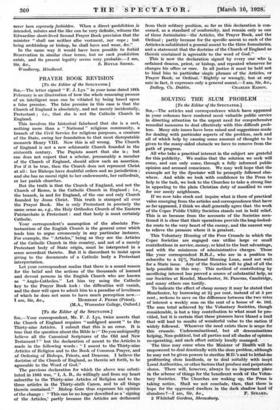[To the Editor of the SPECTATOR.]
SIR,—Your correspondent, Mr. F. J. Lys, twice asserts that the. Church of England requires " unfeigned assent " to the Thirty-nine Articles. I submit that this is an error. It is true that the question about the Bible is : " Do you unfeignedly believe all the Canonical Scriptures of the Old and New Testament ? " but the declaration of assent to the Articles is made in the following words : " I assent to the Thirty-nine Articles of Religion and to the Book of Common Prayer, and of. Ordering of Bishops, Priests, and Deacons. I believe the doctrine of the Church of England, as therein set forth, to be agreeable to the Word of God."
The previous declaration for which the above was substi- tuted in 1865 was, " I, A. B., do willingly and from my heart subscribe to the Thirty-nine Articles of Religion, and to the three articles in the Thirty-sixth Canon, and to all things therein contained." Bishop Gore thus expresses his opinion of the change : " This can be no longer described as a signing of the Articles,' partly because the Articles are dethroned from their solitary position, so far as this declaration is con- cerned, as a standard of conformity, and remain only as one of three forniulariesthe Articles, the Prayer Book, and the Ordinal ; partly because for the specific assent to each of the Articles is substituted a general assentio the three formularies, and a statement that the doctrine of the Church of England as therein contained is agreeable 'to the word of God.".
This is now the declaration signed by every one who is ordained deacon, priest, or bishop, and repeated whenever he changes his office or cure. In all justice it must be held not to bind him to particular single phrases of the Articles, or Prayer Book; im Ordinal. I Rightly or wrongly, but at any rate in fact, it expresses only a general assent.—I am, Sir, &c.,


























































 Previous page
Previous page